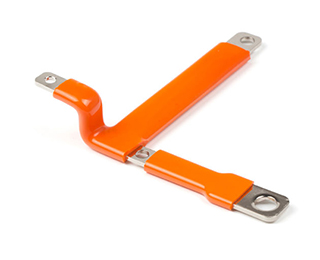2024-09-30 10:30:32
Sustainability has become a cornerstone of modern industrial practices, driving the evolution of materials and technologies aimed at reducing environmental impact. In this context, Nickel Copper Flexible Busbars play a critical role in supporting sustainable manufacturing through their ability to improve energy efficiency, minimize material waste, and enhance the durability of electrical systems. As industries seek greener solutions, these Flexible Busbars offer a pathway to achieving sustainability goals while maintaining high performance and reliability.

One of the core advantages of Nickel Copper Flexible Busbars is their ability to optimize energy efficiency in electrical systems. Copper is well known for its excellent conductivity, allowing electricity to flow with minimal resistance. By using copper as the core material, these busbars ensure low energy loss during power transmission, leading to more efficient systems that require less energy input to achieve the same output. This improvement directly contributes to energy conservation, which is essential in reducing the carbon footprint of industrial operations.
In addition, the flexibility of these busbars enhances their performance in dynamic environments, such as machinery and electric vehicles (EVs), where electrical connections are subject to constant movement and vibration. Their flexible design ensures that connections remain secure and efficient, further reducing power loss that can occur due to mechanical stress. This ability to maintain stable electrical connections in challenging environments ultimately supports energy-efficient manufacturing processes, especially in sectors like renewable energy and electric transportation, where efficiency is paramount.
Sustainable manufacturing also involves minimizing material waste, both during production and over the product lifecycle. Nickel Copper Flexible Busbars offer significant advantages in this regard, primarily due to their long-lasting nature. Nickel plating on copper enhances the busbar’s resistance to corrosion, oxidation, and wear, making it a durable solution that outlasts traditional connectors in harsh conditions. As a result, fewer replacements are required, leading to reduced material consumption over time.
Moreover, the customizability of these busbars allows manufacturers to design systems that use exactly the right amount of material for specific applications. Unlike rigid busbars, which may need to be produced in standard sizes that require trimming or modification, flexible busbars can be manufactured in precise dimensions, reducing offcuts and wasted material during the production process. This level of customization not only supports efficiency in manufacturing but also aligns with waste reduction principles central to sustainable practices.
Durability is a key factor in sustainable product design, as longer-lasting components contribute to less frequent replacements and repairs, which in turn reduces environmental impact. Nickel Copper Flexible Busbars are engineered to withstand extreme conditions, from high temperatures to mechanical stress, without compromising their performance. The nickel plating adds a layer of protection against environmental factors, such as moisture and chemicals, making these busbars ideal for use in harsh industrial settings, including outdoor installations like solar panels and wind turbines.
This enhanced durability ensures that electrical systems equipped with Nickel Copper Flexible Busbars can operate reliably for extended periods, even in demanding applications. Whether used in power distribution units, renewable energy systems, or heavy-duty industrial machinery, these busbars offer longevity that reduces the need for frequent maintenance or replacement, further reducing the environmental impact associated with manufacturing and disposing of electrical components.
A key pillar of sustainable manufacturing is the transition to renewable energy sources, such as solar and wind power. Nickel Copper Flexible Busbars are essential components in the infrastructure supporting these energy systems, providing efficient electrical connections between power generation equipment and the grid. Their high conductivity ensures minimal energy loss in renewable energy systems, improving the overall efficiency of energy conversion and distribution.
In addition, their flexibility makes them particularly well-suited for renewable energy installations, where components may be exposed to varying environmental conditions or require flexible movement to accommodate structural dynamics, such as the rotation of wind turbines. By offering both reliability and efficiency in these applications, Nickel Copper Flexible Busbars enable the expansion of renewable energy infrastructure, a critical aspect of sustainable development.
The global shift towards electric vehicles is another major component of sustainable manufacturing. Nickel Copper Flexible Busbars play a vital role in EV battery systems, where they are used to connect individual battery cells and ensure efficient power transfer. The flexibility of these busbars allows them to withstand the constant vibrations and thermal expansion that occur in EV operations, making them more durable and reliable than rigid alternatives.
Their use in EVs not only enhances vehicle performance by ensuring efficient energy transfer but also contributes to the broader sustainability goal of reducing reliance on fossil fuels. As the demand for EVs grows, the importance of reliable, energy-efficient components like Nickel Copper Flexible Busbars will continue to rise, supporting the ongoing transition to cleaner transportation options.
Looking ahead, the role of Nickel Copper Flexible Busbars in sustainable manufacturing is expected to expand as industries increasingly prioritize energy efficiency, durability, and waste reduction. Innovations in material science and manufacturing processes will likely lead to even more efficient and environmentally friendly versions of these busbars, further driving sustainability efforts.
For example, ongoing research into improving the conductivity of copper or finding alternative nickel coatings with lower environmental impact could enhance the sustainability profile of these busbars. Additionally, advancements in recycling processes for nickel and copper may reduce the environmental footprint of raw material extraction and processing, making these busbars even more attractive from a sustainability standpoint.
Nickel Copper Flexible Busbars represent a forward-thinking solution for industries aiming to adopt sustainable manufacturing practices. By improving energy efficiency, reducing material waste, and enhancing the durability of electrical systems, these busbars help industries reduce their environmental impact while maintaining high-performance standards. As the global push for sustainability continues, Nickel Copper Flexible Busbars will remain a crucial component in the development of more efficient, durable, and eco-friendly electrical systems.